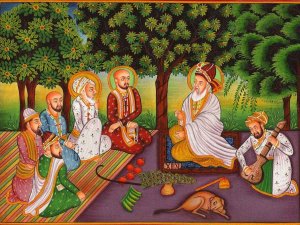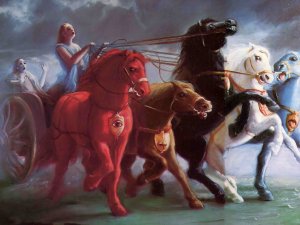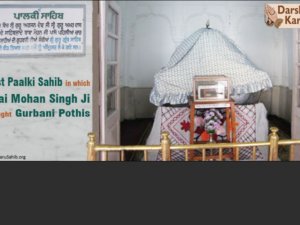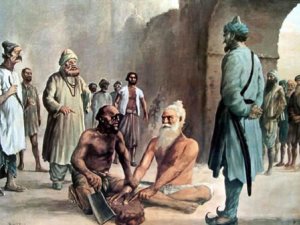 Baba Banda Singh Bahadur, generally called Banda Bahadur, can be counted among the few great generals of the world. In a short period of eight years (1708 to 1716), he subdued and crushed his powerful enemies under his feet. It is a historical fact that he shook the foundation of the seven centuries old mighty Mughal empire and paved the way for the establishment of the Sikh Missals and later the rule of Maharaja Ranjit Singh in 1799.
Baba Banda Singh Bahadur, generally called Banda Bahadur, can be counted among the few great generals of the world. In a short period of eight years (1708 to 1716), he subdued and crushed his powerful enemies under his feet. It is a historical fact that he shook the foundation of the seven centuries old mighty Mughal empire and paved the way for the establishment of the Sikh Missals and later the rule of Maharaja Ranjit Singh in 1799.
A Brave General
The ascetic who turned into Banda Singh Bahadur left Nander with only 25 Sikhs and the blessings of Guru Gobind Singh. From his very childhood, he was fond of riding and archery. He was a youth of active habits and a mine of energy. He was a good marksman and fond of sword and arrow. Historians agree that he was a man of undoubted valor and bravery. In the battle field, he was one of the most daring, sometimes to the extent of recklessness.
He gathered a huge army around him within a few months. From Haryana, he sent letters to Malwa Sikhs to join him in his crusade against Wazir Khan, the murderer of younger Sahibzadas of Guru Gobind Singh. Hari Ram Gupta, an eminent historian, quoting Muslim sources, writes in his book 'History of the Sikhs' Vol, second (page11) that the number of his soldiers had risen to thirty or forty thousands. He conquered Samana in 1709, punished the oppressors and attacked other centers of oppression like Kunjpur, Kapuri and Sadhaura after killing the tyrants. His name struck terror in the heart of lawless people.
 After the arrival of the Majha and the Doaba Sikhs, he started the battle of Chappar Chiri. He had no artillery and no elephants, nor even sufficient number of horses. Only a few of his men possessed matchlocks (rifles.) Long spears, swords and arrows were the only weapons with them. Banda Singh and his devoted Sikhs kept in high spirits. Their zeal for the emancipation of their oppressed and persecuted countrymen and strong faith in the Guru made up for the scantiness of their resources. In spite of his limited resources, he won the battle against heavy odds and after executing Wazir Khan, the killer of younger Sahibzadas, sacked Sarhind. There was a time when his rule extended from the river Ravi to the Ganges and from the neighborhood of Lahore to the vicinity of Panipat. He was caught at Gurdass Nangal after a siege lasting eight months. We was imprisoned and taken to Delhi with his 740 companions where he and his companions were killed mercilessly, but he proved to be a brave general of determination and did not yield.
After the arrival of the Majha and the Doaba Sikhs, he started the battle of Chappar Chiri. He had no artillery and no elephants, nor even sufficient number of horses. Only a few of his men possessed matchlocks (rifles.) Long spears, swords and arrows were the only weapons with them. Banda Singh and his devoted Sikhs kept in high spirits. Their zeal for the emancipation of their oppressed and persecuted countrymen and strong faith in the Guru made up for the scantiness of their resources. In spite of his limited resources, he won the battle against heavy odds and after executing Wazir Khan, the killer of younger Sahibzadas, sacked Sarhind. There was a time when his rule extended from the river Ravi to the Ganges and from the neighborhood of Lahore to the vicinity of Panipat. He was caught at Gurdass Nangal after a siege lasting eight months. We was imprisoned and taken to Delhi with his 740 companions where he and his companions were killed mercilessly, but he proved to be a brave general of determination and did not yield.
A Great Reformer and Administrator
Banda Singh Bahadur’s rule though short- lived, had a far-reaching impact on the history of the Punjab. He introduced the greatest fiscal reform, abolished the Zamindari system and made the tillers of the land masters of the land they cultivated by conferring property rights on them. This was applicable to people of every religion. Thus he demolished the feudal system of society and saved the oppressed farmers from the cruel landlords. In this way, he minimized the difference between the rich and the poor. He was liberal in his treatment of the masses and paid special attention to uplifting the poor. He was a far-sighted administrator and made Mukhlispur (Lohgarh) his capital as it was situated in a hilly area far away from the main road connecting Delhi to Lahore. He also transferred the treasury from Sirhind to the fort of Lohgarh.
After occupying the province of Sarhind which yielded 52 lac rupees annually, he appointed his trusted follower, Baj Singh, its Governor and made Ali Singh his deputy so that they keep an eye on the Mughal troops coming from Delhi.
Fateh Singh was given the charge of Samana and Ram Singh was appointed chief of Thanesar. He introduced coin for business and seal for official work.
Unifying Force
No regular schism appears to have existed among his followers during his lifetime. His magnetic personality kept his followers together up to the last moment of their death and none deserted him. There is only one solitary example of Baba Binod Singh who left Gurdass Nangal, but it could have been on account of a difference of opinion in a council of war. Friction caused due to the introduction of the slogan of ’Fateh Darshan’ instead of 'Vahiguru Ji Ka Khalsa' did not take any critical turn as he did not insist on it when it was rejected by the Khalsa. Those who stuck fast to Banda were called the 'Bandai Sikhs' after his death and the others were called Tatve Khalsa or the real Khalsa. Such a party feeling based on difference of opinion is not improbable in such cases. There has been no feud or cleavage between the two groups on this account.
Bhangu Rattan Singh writes in 'Parrachin Panth Parkash' that a feud took place between Banda Bahadur and the Khalsa at the instigation of Mata Sundri as the result of the Emperor Farrukh Siyar’s negotiations with her. But Dr. Ganda singh has refuted this and writes on page 203 of his book ‘Life of Banda Singh Bahadur':
We have thoroughly searched all available records of Emperor Farrukh Siyar’s so called negotiations with Matta Sundri, but we have not been able to find anything not even the slightest hint of a cursory allusion to support the account of the Panth Parkash. I think we should fully believe the result of the research of eminent scholar and historian, Dr. Ganda Singh.
A Devoted Follower of Guru Gobind Singh
It is wrong to conclude that Banda Bahadur proclaimed himself to be a Guru in succession to Guru Gobind Singh and ignored the instructions given by him. He remained a devoted follower of Sikhism throughout his life and his faith in the Gurus remained unshaken. He had a spotless morality and never committed any one of the four cardinal sins. He married, but in this he comitted no social or moral sin. A letter called Hukamnama written by him in December 1710 after his leaving Lohgarh to the Sikhs of Jaunpur is still available and Dr. Ganda Singh, a well-known Sikh historian has referred to it in his book mentioned above (page 126). The contents of the letter show that Banda Bahadur advises the Sikhs to follow the dictates of the Guru and not his. He writes in this letter: The Guru shall save the entire Khalsa of Jaunpur. Repeat Guru Guru; the life shall be purified.
As a humble follower of the Gurus, after establishing his kingdom, he was the first Sikh general to strike a coin at Lohgarh in the name of Guru Nanak Guru Gobind Singh. Persian inscriptions on the coin when translated meant: 'Coin struck in the two words by the grace of true Lord; victory to Guru Gobind Singh, the King of the kings; the sword of Nanak is the granter of desires'. Words on the reverse meant, 'Coined at the model city, Refuge of the world, the Ornament of the fortunate throne'. He also introduced an official seal. Translation of its Persian words is being given here: 'Kettle (symbol of the means to feed the poor), sword (symbol of the power to protect the weak and helpless), victory and unhesitating patronage have been obtained from Guru Nanak and Gobind Singh'. Inscription on his coins and his seal is an everlasting monument of his devotion to the Gurus. He preferred death to his faith.
Not Anti- Islam
So many misunderstandings have been created about Banda Bahadur by prejudiced Muslim writers and he has been painted by them in the blackest color. Every act of cruelty that they could imagine has been ascribed to him. But we must not ignore the condition of the times. Banda Bahadur was contemporary of Aurangzeb who aimed at converting every non-Muslim to Islam by every means. There was wholesale destruction of Hindu temples and institutions in Northern India.
Banda had seen all this destruction and injustice with his own eyes. Guru Gobind Singh’s young sons were bricked alive. Guru Tegh Bahadur and his companions were martyred and innocent Sikhs were being killed; Banda Bahadur showed that the only way to fight the eternal foe was to adopt the policy of "a tooth for a tooth and an eye for an eye." The mission of Banda Singh has been generally misunderstood by historians who think that he was commissioned by Guru Gobind Singh to avenge the murder of his sons. Had it been so, his work should have been over after the defeat and death of Wazir Khan.
In fact, the Guru entrusted to him the noble task of continuing war against the tyranny of cruel rulers and oppressors. The Muslims were not punished because they were followers of Prophet Mohammad, but because of their persecution of the innocent and religious intolerance. He was not cruel, but was an enemy of the cruel. Dr. Ganda Singh quoting Akhbar-e-Darbar- Mualla, (Jaipur) dated April 28, 1711 writes in his book ’A Short History of Sikhs (pages 104-105): After the conquest of Sarhind, Banda considerably mellowed down in his fury against the Muslim population. He placed no restrictions on their Azan (call for prayer) and Namaz (prayer). At Kalanaur, he recruited 5,000 Muslims in his army.
Conclusion
Banda Singh Bahadur did not die in vain. His sacrifice changed the course of history. The Sikhs saw the difference between those who were in power and those who were out of it. They did not rest till they regained what they had lost and within fifty years they became undisputed masters of the Land of Five Rivers. He deserves to be called the 'Napoleon Bonaparte of the Punjab'. He aimed at the advancement of his Panth and lived up to truth. If he failed in his temporal achievement, it is because the Mughals were too strong for him. No prominent man from the Hindus whose cause the Khalsa had championed came out to render any help. Hill chiefs of the Shiwalik hills were all arrayed against him. Still, he was the first man to deal a severe blow to the intolerant rule of the Mughals in the Punjab. He will be ever remembered for his selfless sacrifices for the sake of persecuted humanity and for his martyrdom. He was the first man who laid down the foundation of political sovereignty of the Sikhs. He had brought about a revolution in the minds of the people. He was a demon in the eyes of the Muslims, a great national hero for Hindus and the empire builder for the Sikhs.





